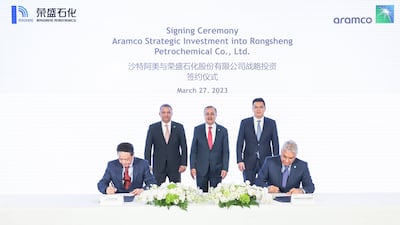A Saudi Aramco unit has acquired a 10 per cent stake in Shenzhen-listed Rongsheng Petrochemical in a deal valued at $3.6 billion that would "significantly" expand its refining operations in China.
Under the terms of the deal, Aramco will supply 480,000 barrels per day of Arabian crude oil to Rongsheng affiliate Zhejiang Petroleum and Chemical Co under a long-term sales agreement, it said in a statement on Monday.
Aramco Overseas Company, a wholly owned subsidiary of the world’s largest oil exporting company, will acquire the shares in Rongsheng Petrochemical.
"It is an important acquisition for Aramco in a key market, supporting our growth ambitions and advancing our liquids to chemicals strategy," said Mohammed Al Qahtani, Aramco's executive vice president of downstream operations.
"It also promises to secure a reliable supply of essential crude to one of China’s most important refiners.”
China is expected to import record volumes of crude this year as it gradually reopens its economy, ending about three years of strict Covid regulations.
The International Monetary Fund expects China’s gross domestic product to grow by 5.2 per cent this year, two percentage points higher than in 2022. Growth rebounded to 8.4 per cent in 2021, following a deceleration after the pandemic in 2020.
The latest deal comes a day after Aramco and its Chinese partners agreed to begin construction on a refining and petrochemical complex in China’s north-east in the second quarter of this year, accelerating a project that was announced in March last year.
The Aramco joint venture, Huajin Aramco Petrochemical Company (Hapco), is developing the complex that can process 300,000 barrels of oil per day and a petrochemical plant capable of producing 1.65 million tonnes of ethylene and 2 million tonnes of paraxylene a year, Aramco said on Sunday.
Aramco, which has a 30 per cent stake in Hapco, will supply up to 210,000 bpd of crude oil to the plant, which is being built in China’s Liaoning province. It is expected to be fully operational by 2026.
The partnership with Rongsheng and Hapco will collectively see Aramco supply a total of 690,000 bpd of crude to high chemical conversion assets, Aramco said.
Rongsheng owns a 51 per cent equity interest in Zhejiang Petroleum and Chemical, which, in turn, owns and operates the largest integrated refining and chemicals complex in China with a capacity to process 800,000 bpd of crude oil and to produce 4.2 million metric tonnes of ethylene per year, the statement said.
“This strategic co-operation ... paves the way for a bright future for the high-quality development of the world’s petrochemicals industry. I believe that Aramco’s involvement will greatly help Rongsheng implement its petrochemical growth strategy," said Li Shuirong, chairman of Rongsheng.
The transaction involves an off-market secondary sale of Rongsheng shares by majority shareholder Zhejiang Rongsheng Holding Group, with potential for future collaboration between the parties in trading, refining, chemicals production and technology licensing, Aramco said.
The deal, which is subject to regulatory approvals, is expected to close by the end of 2023.
Saudi Aramco is “doubling down” on China’s energy supply, its chief executive Amin Nasser said at the China Development Forum on Sunday.
“We want to be an all-inclusive source of energy and chemicals for China’s long-term energy security and … high-quality development.
“That’s why we are doubling down on China’s energy supply, including new lower carbon products, chemicals, and advanced materials, all supported by emissions reduction technologies.”
Despite a surge in China’s imports of Russian crude last year, Saudi Arabia remains the country’s top crude supplier.
Saudi Arabia exported 87.49 million tonnes of crude oil to China in 2022, which is equal to 1.75 million bpd, according to Chinese customs data.


